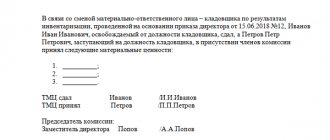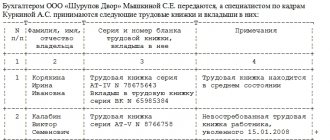Changing a director is a standard step-by-step procedure. One of its main components is the transfer of affairs from the outgoing director to a new director elected in his place. The process also involves the transfer of all available documentation to the organization, which is recorded by drawing up and signing a transfer and acceptance certificate.
The obligation to transfer documentation may be reflected in local acts, for example, in the relevant Regulations on the transfer of documents. At the legislative level, the transfer of affairs between managers is noted:
- provisions of Federal Law No. 402 “On Accounting” dated December 6, 2011, specifically, paragraph 4 of Art. 29 (regarding accounting documentation);
- Federal Law No. 395-1 “On Banks...” dated December 2, 1990, Art. 24 (for credit and financial structures);
- by the decision of the Board of Rosarkhiv dated 02/06/2002, in detail, in the “Basic Rules for the Operation of Archives”, clause 10.5 (for government agencies);
- methodological guidelines for accounting for inventories (clause 22), approved by Order of the Ministry of Finance of the Russian Federation No. 119n dated December 28, 2001 (on the need to carry out an inventory when replacing materially responsible persons, in this case - when replacing a director).
The procedure for transferring cases is not regulated by law. Therefore, it is free in nature and is carried out without clearly defined guidelines. The essence of the question is the following. The former director, being a financially responsible person (in accordance with Article 277 of the Labor Code of the Russian Federation), must give the new head of the organization all the documentation that he kept.
Why do you need an act of transfer of affairs when changing the director?
When changing the head of an organization, the transfer of documents previously in the possession of the previous director is a typical procedure arising from the logic of corporate legal relations. As a rule, we are talking about the originals of the relevant documents, and if the previous manager does not transfer them to the new one, in many cases it is extremely difficult to restore them. Especially if these are documents belonging to the following categories:
- constituent (registration);
- primary;
- licenses and permits;
- powers of attorney;
- international treaties.
The fact of transfer of these sources is recorded in a separate act of acceptance and transfer of documents when the director of the organization changes. It is compiled in 2 copies.
These instances can subscribe:
1. Former (retiring) and new manager.
But in this case, a problem may arise: from the moment the documents are transferred, the departing manager may lose actual access to the necessary information and will not be able to fully perform his still relevant duties.
2. The former (retiring) manager and his deputy (full-time or appointed).
In this case, the still acting director can request the necessary information from the deputy, who will have access to the documents. After the new director returns to work, the deputy can immediately transfer the received documents to him (as an option, using an act with a similar structure).
If necessary, the act can be supplemented with various annexes, for example:
- photocopies of the most important documents (they can also be certified by the sending and receiving parties);
- inventories of documents (accordingly, the act itself may contain references to inventories).
Find out how to transfer affairs when changing the head of an organization in ConsultantPlus. If you don't have access yet, get a free trial online.
What to do if officials change
When there is a change of officials, when there is a protocol of the meeting of founders, an order is issued, first of all it is necessary to notify the regulatory authorities (tax office) and the bank servicing the enterprise.
To do this, a notarized statement is written stating that the official who has the right to sign is changing on the basis of the attached document.
The application is accompanied by an order of dismissal, a decision of the owner of the enterprise or the minutes of the general meeting of shareholders.
After this, an order is issued for the enterprise to create a commission to conduct an inventory and receive and transfer documentation from the resigning official.
If there is already a new candidate for the vacant position, the cases are transferred to him.
In the event that a vacancy remains vacant, an employee of the enterprise is appointed by order, who will accept documents before appointing a new manager to the position.
If it is possible to invite an independent auditor, this will be the best solution to the issue, which will not interfere with subsequent inspections by regulatory authorities.
If a new director is appointed later, the employee of the enterprise appointed by order to receive documents will also transfer the documents stored with him according to the act.
When the chief accountant resigns, the head of the enterprise has the right to accept all matters and documents according to the transfer act.
There is no approved form for carrying out the procedure for transferring cases.
It is done arbitrarily, but must be formalized in writing.
The act is usually drawn up in two copies.
One copy remains at the enterprise for the new manager, the second is given to the former director.
The former manager needs the act so that in the event of subsequent claims regarding the documentation submitted to him, no questions or disagreements arise.
If violations are identified during the inventory or transfer of documents, this is documented in the act and the official writes an explanatory note regarding the shortcomings and comments.
In the event that it is discovered that the documents or material assets that were registered with the manager, and he is financially responsible for them, are not sufficient, that is, they are simply not available, law enforcement agencies are notified and then the transfer of documentation occurs in the presence of their representative, included in the commission.
If significant violations are identified, the newly appointed manager or chief accountant cannot be held liable.
According to the law, the director during whose leadership violations were committed will be held accountable.
Is the former general director obligated to hand over documents under the deed?
The obligation of a resigning director or one who has actually terminated his employment relationship with the company to transfer documents to the new director is not fixed at the level of industry-wide federal regulations. However, this obligation is fixed:
- regarding the transfer of accounting documents - the provisions of clause 4 of Art. 29 of the Law “On Accounting” dated December 6, 2011 No. 402-FZ.
- in Art. 24 of the Law “On Banks...” dated December 2, 1990 No. 395-1 - however, the jurisdiction of these norms extends only to credit and financial legal relations.
- in clause 10.5 of the “Basic Rules for the Operation of Archives”, reflected in the decision of the Board of Rosarkhiv dated 02/06/2002 (mandatory for government organizations).
In addition, the Arbitration Court of the Sverdlovsk Region, in decision dated January 21, 2014 No. A60-34604/2013, ordered the defendant, the former head of the company, to transfer the documents entrusted to him to the new director of the organization. The court found that the requirement to transfer documents must be presented to the former general director, and when the director changes, the seal, constituent, accounting and other documents must be transferred to the newly elected head of the organization. The appeal upheld the arbitration decision.
Thus, in the local regulations of the organization, it is lawful to establish provisions regulating the mandatory transfer of documents from the former manager to the new one.
Transfer of documents by the former director to the new one: local regulations
The corresponding standards can be fixed at the level of regulations, for example, the Regulations “On the transfer of documents of the organization by the executive body upon dismissal from office.” It is optimal if it is put into effect by order of the founder of the organization. The standard under consideration may contain the following language:
1. Confirming the main lists of documents to be transferred from the former director to the new (deputy) director.
These lists may include, as we noted above:
- constituent (registration) documents;
- primary;
- licenses and permits;
- powers of attorney;
- international agreements.
You can also define the following categories:
- accounting documentation (those that are directly at the disposal of the general director);
- securities, bills and other financial documents;
- certificates of ownership and other title documents;
- other documents (for example, reports and memos, internal corporate reports).
2. Regulating the drawing up by the director transferring his powers of an act in which documents will be transferred in accordance with the main lists also established by the Regulations.
This act, as we noted at the beginning of the article, is drawn up in 2 copies: the first is given to the former director, the second to the new (or deputy director).
3. Regulating the addition by the director of the act of acceptance and transfer of documents with various annexes.
Local regulations may be supplemented by provisions establishing the official responsibility of the director’s secretary to assist his boss in preparing the act and appendices.
Step-by-step instructions for changing the director were prepared by ConsultantPlus experts. Learn with a free trial of the legal system.
How to do it?
The director, first of all, is obliged to notify his management, which is the general meeting of LLC members, of his intention to resign. For this purpose, an extraordinary general meeting is convened (Article 35 of Law No. 14-FZ), to which the director submits his application. Everyone who has the right to attend the meeting is sent a notification, and not only an invitation with an agenda is placed in the envelope, but also a photocopy of the application from the head of the company for settlement.
Order
At such a meeting, they decide who can accept the cases and issue an order for the acceptance of cases, establishing the composition of the commission and assigning to the person who has been entrusted to act as a representative of the LLC in the procedure for accepting cases, the right to carry out this acceptance and draw up an act. The deadlines are agreed upon when the act must be ready, and the resigning director can receive a full and final payment.
Usually the order is prepared by members of the LLC supervisory board, and one of them accepts the case from the director.
Completion of accounting processes
The first person does not have the right to leave without completely closing the month or quarter or half year that has expired. Together with the company's accountant, the manager reports to the tax office, stat. management, makes all necessary payments and deductions to funds, budget, signing all documentation.
On the first day of the month, which the company will complete under the leadership of another person, the still working director is obliged to complete the accounting processes : reports, balance sheet, register of receivables and payables, availability of available funds, I give reason to get an idea of what the financial condition of the company is in the current month.
Inventory
Although Art. 277 of the Labor Code of the Russian Federation and provides for the financial responsibility of the first person of the company, but this means something completely different than direct responsibility for materials and products listed on the accounts of employees who use the received materials in their production activities.
In any case, even if there are no materials, structures, etc. on the director’s account, it is still important at the time of dismissal of the director for the supervisory board of the LLC to know how things are going with the values recorded on the employees’ account - whether they are all available, or there is theft. Therefore, an inventory must be carried out, if not in full, then at least selectively - for the most expensive or most significant materials in terms of volume, quantity or cost.
To do this, statements of material balances are printed based on the results of write-offs for the past month. The number of pieces, cubic meters, liters indicated in the balance (in accordance with the item registration number) must be available and is subject to presentation to the commission. If there is a shortage of quantity, an explanation must follow, and lack of availability does not mean a shortage. The fact is that materials can be used for business and cannot yet be written off, since the current month has not ended.
If misgrading is identified, an explanation is drawn up, and the shortage of one material must be compensated by saving on another, which is listed as surplus. All deviations from the accounting records are reflected in the inspection report. Inventory provides an answer to the question of shortages resulting from theft.
Examination
If among the members of the supervisory board of an LLC there are no people with sufficient competence, or if it is necessary to audit the work of a large enterprise, it is logical to entrust the audit to an audit company. Auditors will quickly and efficiently check the financial activities of a company whose head is leaving the company, and will present a report to the supervisory board that will give an objective assessment of the state of the enterprise at the current time.
Act of acceptance and transfer of documents from the former director to the new one: document structure
Such an act may contain the following elements:
1. Information block, which reflects:
- date, place of drawing up the act;
- Full name of the resigning director;
- Full name of the new director (deputy).
2. Block, which reflects the actions certified by the act: transfer by the resigning director and acceptance by the new one of documents related to the financial and economic activities of the organization.
3. Block with a list of documents to be transferred (by categories, which are reflected in the Regulations).
This block is optimally presented in the form of a table, the columns of which reflect:
- serial number of the position;
- name of the transferred documents (inventory numbers for groups of transferred documents);
- number of sheets of transferred documents (number of documents in inventories);
- necessary notes.
4. Block with signatures:
- the person transferring powers and documents;
- person accepting powers and documents.
In some cases, this block may be supplemented with signatures of the chief accountant and other competent persons. In addition, there is a possibility that the deed will need to be certified by a notary. Let's consider what factors this may be due to.
Transfer of documents under the act: nuances
We are talking about the following nuances:
1. Since the resigning general director has the status of a financially responsible person (Article 277 of the Labor Code of the Russian Federation), before transferring documents he needs to conduct an inventory of property and papers certifying the property rights of the organization (clause 22 of the Methodological Instructions by order of the Ministry of Finance of the Russian Federation dated December 28, 2001 No. 119n), for example securities, bills.
2. Simultaneously with the inventory of property, it is useful to initiate a similar procedure in relation to all transferred documents. If some documents are missing, information about this can be reflected in the act or in a separate appendix to it (in fact, the results of the inventory of documents can be recorded in it).
3. Confirmation of the authenticity and completeness of the transferred documents can be carried out with the involvement of third parties, for example, the chief accountant, financial director. At the same time, they can carry out these actions as members of a special commission (the procedure for convening it may also be regulated by local regulations). The commission may also include other specialists - for example, a document specialist, an accountant.
It happens that the competencies of the new general director are not enough to determine the authenticity or completeness of a particular financial document - in this case, it is impossible to do without the involvement of company specialists (sometimes independent experts).
In turn, the signature on the act of the new general director (deputy), certifying the fact that he received documents from the former, as well as the signature of the chief accountant, can be certified by a notary present.
What to do if the notice period for dismissal has expired, but you haven’t had time to hand over your responsibilities?
If the notice period for dismissal has expired and the handover has not taken place, then the director has the right to convene another general meeting to postpone the moment of dismissal for a week or two, but there is another option. You can also invite a notary and hand over to him, according to the inventory, everything that has been prepared for delivery to the successor; in this case, no one will blame him for the fact that the person resigning did not transfer his inheritance to anyone.
In a situation where the current manager has decided to change his job, you should not interfere with him if the decision is firm. Both parties will only benefit from documenting the fact of delivery and acceptance of cases.
Didn't find the answer to your question? Find out how to solve exactly your problem - call right now:
+7 (Moscow)+7 (812) 490-75-26 (St. Petersburg)
Where can I document the transfer of documents when changing the director?
You can download a completed sample act of acceptance and transfer of documents when changing the head of an organization on our website.
This sample is designed for certification of both copies of the act by the former and new general director and chief accountant of the organization. If necessary, a notary can put his details on it.
You can get acquainted with other useful nuances of interaction between a private organization and a notary in the article “The Federal Tax Service clarified when it is not necessary to have a decision to increase the authorized capital certified by a notary.”
Stages of work
Both the replacement of the general director in an LLC and the change of the sole founder in an LLC, step-by-step instructions for inventory will be the same in both cases.
A change of founder and a change of director should always be accompanied by a step-by-step inspection:
- drawing up and approving an order to conduct an inventory;
- holding a meeting of members of the inventory commission, during which it is necessary to:
- identify objects of inspection;
- distribute responsibilities;
- draw up and approve individual work plans;
- provide instructions;
request from the director the latest receipts and expenditure documents, as well as receipts for the delivery of similar papers to the accounting department or members of the commission; preparation of inventory lists reflecting the number of property according to accounting data; sealing the rooms in which the commission will work; checking the compliance of the actual availability of property objects with accounting data and recording this fact in inventory records; then, using the accounting department, a summary statement is compiled (forms No. INV-18 and No. INV-19 are recommended), reflecting the discrepancies between the actual and recorded quantities of material assets and endorsed by each member of the inventory commission; the chairman of the inventory commission and the chief accountant of the organization prepare proposals for resolving issues with discrepancies between the actual and recorded quantities of individual items; adjustment of identified sins in accounting based on the decision made to resolve discrepancies.
Results
The general director leaving the company must transfer the documents entrusted to him to the new one. The procedure for this transfer can be regulated at the level of local standards (established as an obligation in financial and government organizations). The main local legal act certifying the acceptance and transfer of documents when changing the director may be an act drawn up in 2 copies.
You can learn more about the features of legal relations that are carried out within the framework of corporate law in the articles:
- “Dismissal of the General Director at his own request”;
- “Sheet for familiarization with local regulations - sample”.
Sources:
- Federal Law of December 6, 2011 N 402-FZ “On Accounting”
- Federal Law of December 2, 1990 N 395-1 “On Banks and Banking Activities”
- Order of the Ministry of Finance of Russia dated December 28, 2001 N 119n
- Labor Code of the Russian Federation
You can find more complete information on the topic in ConsultantPlus. Free trial access to the system for 2 days.










